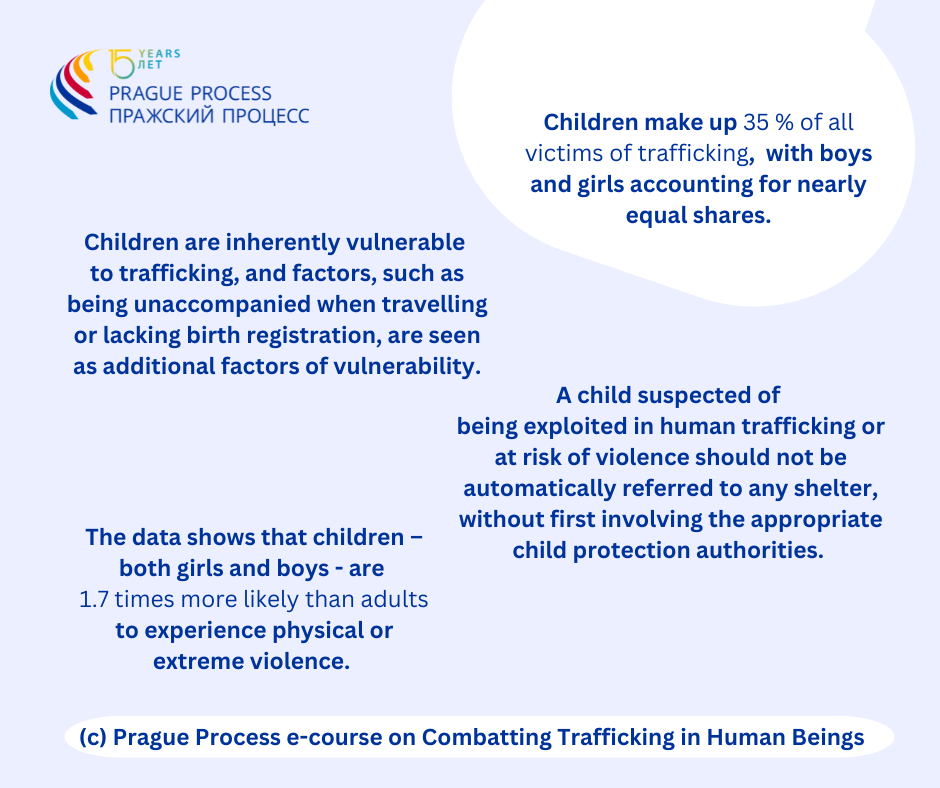June 1st marks International Day for Protection of Children. It was established over half a century ago to protect children’s rights, end child labour and guarantee access to education. The Prague Process uses this occasion as a reminder of children’s inherent vulnerability to trafficking in human beings, a crime which continues to affect millions of young lives worldwide.
The statistics are grim: children constitute 35% of all trafficking victims, with girls and boys accounting for nearly equal shares. Children's inherent vulnerability, exacerbated by factors such as poverty, conflict, and lack of legal protection makes them prime targets for traffickers who exploit their innocence and helplessness for various forms of exploitation. Moreover, their vulnerability to trafficking is exacerbated by factors such as unaccompanied travel and lack of birth registration.
Human trafficking is closely related to violence, conflict and instability. Children are 1.7 times more likely than adults to suffer extreme violence, regardless of their region of origin or the form of exploitation involved. Wars and civil strife displace large populations, leaving orphans and street children at high risk of exploitation. Criminal organisations exploit the chaotic environment to abduct or recruit children for forced labour, sexual slavery, and even as child soldiers. According to UN data, about 8% of children recruited in conflict areas in 2020 were trafficked by governmental forces, with the majority being exploited by non-state militias.
Economic hardship is a critical factor leading to child trafficking. Families in poverty may be coerced or misled into giving their children to traffickers with false promises of education and better living conditions. Children from impoverished backgrounds are often trafficked for labour exploitation in sectors such as agriculture, mining, and domestic servitude. Boys are particularly vulnerable to labour exploitation, being twice as likely as girls to fall victim to such practices. The International Labour Organisation estimates that forced labour, which includes significant child labour, generates approximately 51 billion US dollars annually.
Sexual exploitation is one of the forms of trafficking involving children. Girls are especially vulnerable, often being lured or coerced into prostitution or pornography. However, data from the EU for 2019-2020 shows that 35% of trafficking victims were children with nearly equal shares of boys and girls being exploited.
International obligations, as outlined in the Palermo Protocol and the Convention on the Rights of the Child, require states to protect the rights of all children, including those who migrate irregularly. The Palermo Protocol, universally accepted, emphasizes the need to combat trafficking in persons, especially women and children. The Prague Process participating states have also committed themselves to addressing human trafficking as part of the broader area of preventing and fighting irregular migration and migrant smuggling.
International legal instruments such as the Palermo Protocol and regional agreements like the EU Anti-Trafficking Directive provide frameworks for addressing this crime. However, effective implementation and international cooperation are crucial. This involves enhancing socio-economic conditions, raising public awareness, and improving legal protections to prevent trafficking and support victims adequately.
Protecting children from trafficking is not only a legal obligation but also a moral imperative demanding urgent and sustained action. On this Day, we call on states and partners to safeguard children’s rights and intensify efforts to combat human trafficking.
To learn more about the phenomenon of trafficking in human beings and effective strategies to combatting this crime, access the Prague Process e-course on combatting trafficking in human beings.
Subscribe to the Prague Process mailing list here in order to keep up to date with the latest developments outlined in our Quarterly Review.

